4-Fluorophenylacetylene
- CAS NO.:766-98-3
- Empirical Formula: C8H5F
- Molecular Weight: 120.12
- MDL number: MFCD00168823
- SAFETY DATA SHEET (SDS)
- Update Date: 2023-12-26 11:30:52
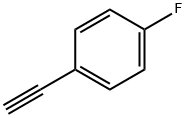
What is 4-Fluorophenylacetylene?
Chemical properties
White Crystalline Solid
The Uses of 4-Fluorophenylacetylene
Intermediates of Liquid Crystals
The Uses of 4-Fluorophenylacetylene
Intermediates of liquid Crystals. As pharmaceutical intermediates. As organic synthesis intermediates. For vacuum deposition.
The Uses of 4-Fluorophenylacetylene
1-Ethynyl-4-fluorobenzene, a substituted phenylacetylene, may be used in the synthesis of aryl acetylenes, via Sonogashira type cross coupling reaction with various haloarenes in the presence of bis(μ-iodo)bis((-)-sparteine)dicopper(I) catalyst.
Synthesis Reference(s)
Synthesis, p. 589, 1996 DOI: 10.1055/s-1996-4265
General Description
1-Ethynyl-4-fluorobenzene (pFAB) is a fluorobenzene derivative. Trianionic pincer alkylidyne complex catalyzed polymerization of 1-ethynyl-4-fluorobenzene has been reported. The surface of the iodophenyl-terminated organic monolayers has been modified by Sonogashira coupling of the iodophenyl groups found on the surface with pFAB. Dimerization catalyzed by Y[N(TMS)2]3 and 4-chloroaniline gave exclusive formation of one of three possible enediynes in excellent yield.
Properties of 4-Fluorophenylacetylene
| Melting point: | 26-27 °C(lit.) |
| Boiling point: | 55-56 °C40 mm Hg(lit.) |
| Density | 1.048 g/mL at 25 °C(lit.) |
| refractive index | n |
| Flash point: | 29 °C |
| storage temp. | 2-8°C |
| solubility | soluble in Chloroform, Diethyl Ether, Ethanol |
| form | Liquid After Melting |
| color | Clear colorless to yellow |
| Specific Gravity | 1.048 |
| Water Solubility | Soluble in chloroform, diethyl ether, acetone, dichloromethane, hexane and ethanol. Highly soluble in toluene. Insoluble in water. |
| BRN | 1099285 |
| CAS DataBase Reference | 766-98-3(CAS DataBase Reference) |
| NIST Chemistry Reference | 4-FC6H4CCH(766-98-3) |
Safety information for 4-Fluorophenylacetylene
| Signal word | Danger |
| Pictogram(s) |
 Flame Flammables GHS02  Exclamation Mark Irritant GHS07 |
| GHS Hazard Statements |
H228:Flammable solids H315:Skin corrosion/irritation H319:Serious eye damage/eye irritation H335:Specific target organ toxicity, single exposure;Respiratory tract irritation |
| Precautionary Statement Codes |
P210:Keep away from heat/sparks/open flames/hot surfaces. — No smoking. P240:Ground/bond container and receiving equipment. P241:Use explosion-proof electrical/ventilating/lighting/…/equipment. P261:Avoid breathing dust/fume/gas/mist/vapours/spray. P302+P352:IF ON SKIN: wash with plenty of soap and water. P305+P351+P338:IF IN EYES: Rinse cautiously with water for several minutes. Remove contact lenses, if present and easy to do. Continuerinsing. |
Computed Descriptors for 4-Fluorophenylacetylene
| InChIKey | QXSWHQGIEKUBAS-UHFFFAOYSA-N |
New Products
Tert-butyl bis(2-chloroethyl)carbamate (S)-3-Aminobutanenitrile hydrochloride N-Boc-D-alaninol N-BOC-D/L-ALANINOL 3-(2,4-Dimethoxybenzyl)dihydropyrimidine-2,4(1H,3H)-dione 7-Bromo-1H-indazole N-octanoyl benzotriazole 3,4-Dibenzyloxybenzaldehyde 4-Hydrazinobenzoic acid Electrolytic Iron Powder Fmoc-Val-Cit-PAB 1,1’-CARBONYLDIIMIDAZOLE R-2-BENZYLOXY PROPIONIC ACID 4-HYDROXY BENZYL ALCOHOL 1,1’-CARBONYLDI (1,2-4 TRIAZOLE) S-2-CHLORO PROPIONIC ACID (2-Hydroxyphenyl)acetonitrile 4-Bromopyrazole 5-BROMO-2CYANO PYRIDINE 5,6-Dimethoxyindanone 5-broMo-2-chloro-N-cyclopentylpyriMidin-4-aMine 1-(4-Methylphenylsulfonyl)-1H-1,2,3-benzotriazole 1-(2-Chlorobenzyl)-4-nitro-1H-pyrazole 1-(2-Nitrophenyl)-4-phenylpiperazineRelated products of tetrahydrofuran


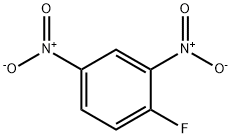
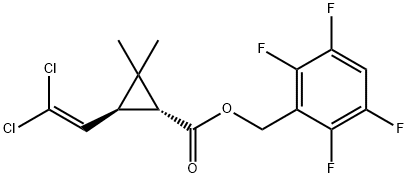
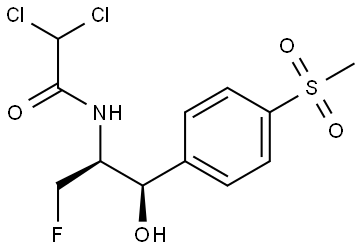
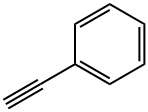
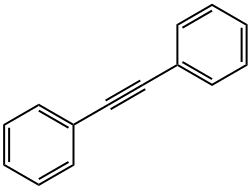

You may like
-
 766-98-3 4-FLUORO PHENYL ACETYLENE 98%View Details
766-98-3 4-FLUORO PHENYL ACETYLENE 98%View Details
766-98-3 -
 4-Fluorophenylacetylene, 99% CAS 766-98-3View Details
4-Fluorophenylacetylene, 99% CAS 766-98-3View Details
766-98-3 -
 1-Ethynyl-4-fluorobenzene CAS 766-98-3View Details
1-Ethynyl-4-fluorobenzene CAS 766-98-3View Details
766-98-3 -
 1-Ethynyl-4-fluorobenzene CAS 766-98-3View Details
1-Ethynyl-4-fluorobenzene CAS 766-98-3View Details
766-98-3 -
 1446013-08-6 Fmoc-His-Aib-OH TFA 98%View Details
1446013-08-6 Fmoc-His-Aib-OH TFA 98%View Details
1446013-08-6 -
 127464-43-1 99%View Details
127464-43-1 99%View Details
127464-43-1 -
 2-ETHYLPYRIDINE 100-71-0 99%View Details
2-ETHYLPYRIDINE 100-71-0 99%View Details
100-71-0 -
 13162-05-5 99%View Details
13162-05-5 99%View Details
13162-05-5